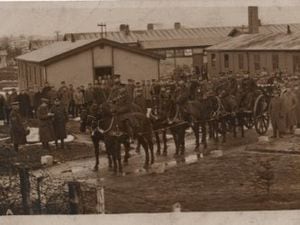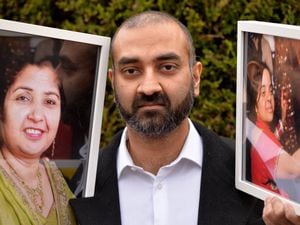Helping stop the horror stories: Charities count cost of Covid-19
Hospices and charities in the region are battling back after a "rollercoaster" of a year that saw them pushed to the brink.
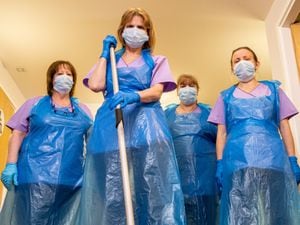
Coronavirus – and three national lockdowns – has caused charities to financially struggle due to shops closing and events being cancelled.
It led to a number of emergency appeals being launched in the Black Country and Staffordshire for help to survive the financial difficulties.
Retail shops may have closed and fundraisers may have been cancelled, but charities are still there offering support to the most vulnerable across the region.
Cannock-based Newlife saw demand for its emergency response service, which aims to get equipment to families within 72 hours, increase by almost 60 per cent.
And occasionally the demand from families, who need the vital piece of equipment to properly look after their loved ones, has surged to almost double the previous year.
Stephen Morgan, director of operations, said: "There's times it's doubled but that's not surprising in many ways – many services are being diverted to the Covid effort but it's left families, who were already at breaking point in March last year, facing difficulty.
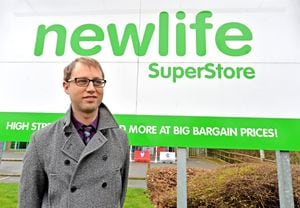
"There's been some horror stories – one where a woman said her husband had unfortunately got Covid and she was left caring for her disabled daughter without the right equipment.
"Situations like that are happening all of the country and we've had to provide essential equipment to get the children out of Covid-riddled hospitals and the only way they could leave is with specialist care – wheelchairs and beds – so they can be safe. So we provided that equipment to get children out of hospital which they, and the medics, don't want them to be in."
Newlife has gone online, selling goods through Ebay, Depop and Shopify while shops been closed, and furloughed almost all of its staff as the charity faces a financial black hole of around £2 million.
Mr Morgan said: "We're around about that now [the £2 million mark], so about £1.9 million right now and the fact we've got through two lockdowns – and the sizeable one we're getting through currently – with shops reopening in April is good news. We've had to fully furlough, or flexi-furlough, around 85 to 95 per cent of staff to cut costs so obviously that's one way of trying to maintain that, but we're proud we've survived and that we've helped so many families.
"But we've got about £230,000 worth of applications for equipment we just don't have the funding for. The fact we've survived this year is fantastic because it's been a challenging year and we want to help as many children and their families as we can.
"It's a fairly positive thing [reopening shops] in the fact it's still our main source of income. We can open up again but it's also great news for the local community because we can welcome staff back – we know they're itching to return since the stores closed. And we know there's lots of people who love a bargain – it's definitely something to look forward too.
"And words don't do justice in terms of how grateful we are [to people who have helped Newlife] – thank you to the people who have donated, whether it be volunteers who have donated their time, or people who have donated money, it's not been an easy year for many people so we're so very very grateful. All of the money is changing children's lives – all of the money people have donated is making such a difference so thank you so much."
Richard Soulsby, chief executive at Katharine House Hospice, described the past year as being difficult operationally due to staff making "huge adjustments" to support patients.
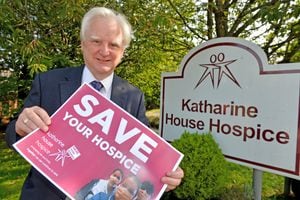
He said there was a concern that more people will need the charity's services in the future due to Covid-caused delays to treatment, but said both hospices and the NHS have had to change their working practices to benefit patients.
Mr Soulsby said government support meant the hospice had no financial concerns until July but had since struggled to balance the books and been forced to make redundancies.
He said: "Our year has been divided into three – the first part the Government said they would support hospices and that was very beneficial for Katharine House up to July, we had no concerns.
"After that we want into freefall and were facing a very serious financial problem and regrettably, we had to make some big cost reductions – compulsory redundancies – which we tried to avoid. The staff have shown tremendous flexibility – they've reduced their hours to keep others in jobs and some of the responses have been absolutely phenomenal.
"The third part we launched the emergency appeal and the response from the community was amazing – we raised more than £900,000 and then the Government have stepped in and said they will make more funds available, it's much lower for us, but it allows us to look forward to financial stability for the next year and restore our services.
"The service may not be the same going forward but there will be service provision across our areas. And we'll see if they need to be virtual to support more families through learning amid the pandemic. It's been like a rollercoaster really.
"Our biggest financial concern is around retail – we are, as a hospice, very reliant on the retail operation and it clearly went to zero. We've spent more months in lockdown with them being shut than we have operating them over the past year. We've had to close shops and that was something very difficult to do, considering we have had some very loyal workers. Losing them was a real sadness and part of that rollercoaster.
He added: "To our staff, they've worked in extremely difficult circumstances and so many of them have worked way beyond their role to support our patients – many of them have had to be furloughed and we appreciate it's a stressful situation for many of them. The other group I want to thank is the local community because the response to the emergency appeal has been phenomenal – they've really made sure the hospice can continue to deliver for the next year or so."
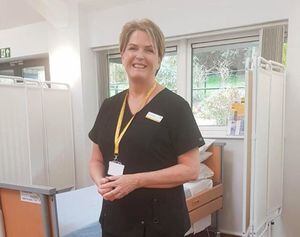
Compton Care in Wolverhampton is another hospice which has seen demand increase during the pandemic.
Chief executive Rachel Overfield said: "It's been very difficult from a number of perspectives, really, and it's the same message from all charities. It's been difficult because we've been clinically much busier because we deal in death and dying and Covid has created more death and dying.
"We've been a lot busier – we started out with a fairly small workforce who have also been challenged by Covid and our income streams have been challenged due to our 25 shops closing. Events have not been happening either so it's been a really tough year for us.
"We've been very lucky because of the type of charity we are the Government and the NHS have stepped in to help hospices – we get some grant funding as long as we can provide we're helping the NHS. It doesn't give you that long-term stability, it will get us through the year, furlough has helped as well, but it is not completely resolved the financial pressures going forward.
"I've been incredibly grateful to the community for their constant support they've given us despite them being affected as well. And all the work is going on behind the scenes [to open stores] and on April 12 we're looking to open them. And we're looking for new retail opportunities to branch out as well, into other things like coffee shops and garden centres where people are still spending their money. It's different ways of generating income and we're also looking forward to events restarting."
Ms Overfield said the organisation was hopeful about the future – but raised concerns of the pressure on services post-Covid, due to late diagnosis caused by the disruption the virus has had on the NHS.
She added: "I think we're quite hopeful but we're concerned about Covid continuing to be around. It puts pressure on our clinical services and longer term, we're concerned about late diagnosis – where the NHS have not been able to do things in a timely way, due to Covid, and we might see a longer-term impact of that. Because people have had their treatment delayed, but nobody knows the true impact that'll have but we're looking forward to returning to a degree of normality – a new normal.
"I want to say thank you to everyone, too, and words aren't enough [to say how much the support means to them]. We really appreciate it and I appreciate everything my staff have done whether they are clinical staff or support staff, or even the retail guys coping with furlough. I'm incredibly appreciate of our staff and to our local community who keep us going – we will never be able to express how grateful we are."

